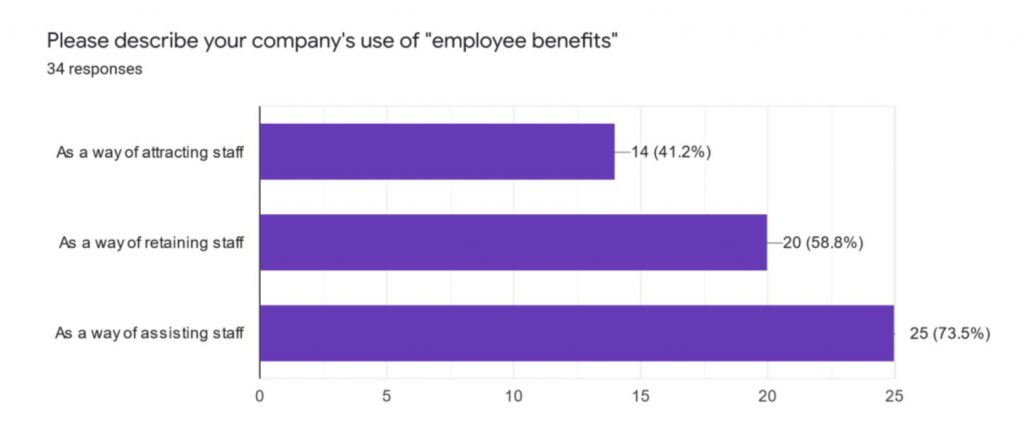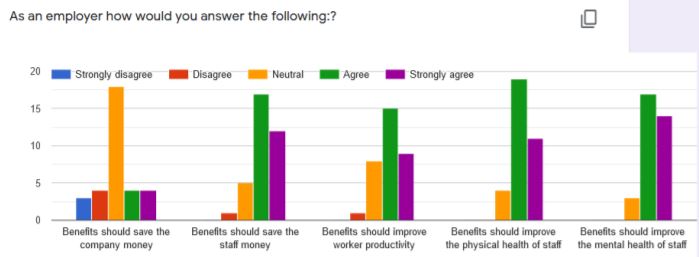What motivates UK employers to provide employee benefits? It’s a question that Enjoy Benefits director Vic Johnston set out to answer in academic research for the University of Salford Business School in 2021.
Is there a financial incentive? Do benefits help to attract and retain staff? Is it mainly to assist staff? The answer is, of course, all of the above.
However, the findings from Vic Johnston’s research sheds a new light on the value of employee benefits, not just to staff members, but also to the businesses themselves.
Who benefits most from employee benefits?
Vic Johnston’s 2021 study looked at the existing research on employee benefits and gathered new quantitative data from anonymised spending patterns of nearly 2,000 Enjoy Benefits clients.
Vic also gathered fresh data from a questionnaire sent to a smaller sample of participants. The questionnaire included a single free-form answer, so that respondents – mainly managers of benefits programmes – could share their sentiments about employee benefits.
The free-text question was: “What motivates your company to select and provide or deny employee benefits to your staff?”
Interestingly, the words they chose were mostly ‘caring’ ones, showing that they believed the real value of employee benefits lay in helping and supporting staff. Altruism was certainly one of the drivers behind providing benefits to staff, according to the responses in the survey.
Words reveal ‘caring’ feelings around benefits
According to Vic Johnston’s report: “The phrases used when answering the only open-ended research question all fell within what would reasonably be described as caring for the employees.”
“When reviewing the responses, there were 21 free-text responses, and coding the sentiment of the responses would suggest that 18 of the 21 responses could be construed as caring by the employer towards their employees.”
The word cloud below (Figure 1) shows the words most commonly used in the response to being asked ‘what motivates the company to provide employee benefits?’.

Figure 1: Word cloud showing responses to the question: “What motivates your company to select and provide or deny employee benefits to your staff?”
It’s clear from the word cloud that the employee features strongly, rather than the organisation. And words like ‘benefit’ ‘provide’ ‘help’ ‘encourage’ ‘relationship’ and ‘individual’ all express positive and caring emotions.
Bosses want to ‘assist’ staff with benefits
Answers to another question in the survey backed up this positivity towards employees, and places staff at the heart of why businesses offer employee benefits.
When asked to describe their company’s use of employee benefits, the respondents overwhelmingly said it was to assist staff (75%) rather than to attract staff (41%) or retain staff (58%). The chart below (Figure 2) shows these responses.

Figure 2: Most businesses said they used employee benefits as a way of assisting staff.
More signs that benefits are ‘for’ staff
There was more evidence of the positivity of employers towards their employees in response to a further question. Participants in the survey were asked to rate responses that would help to gauge what employers thought benefits should achieve.
The answers are shown in the figure below (Figure 3). Participants tended to ‘strongly agree’ that benefits should save staff money, improve mental health, and improve physical health.

Figure 3
Figure 3 also shows that participants were overwhelmingly neutral about whether benefits should save the company money. This option also got the highest negative scores (strongly disagree and disagree) and the lowest positive scores (agree and strongly agree).
Where sentiment and data differ
According to Vic Johnston’s research, bosses saw the ‘caring’ aspects of employee benefits as a primary value. Eighty-eight percent of them believed that employee benefits cost the company money.
The surprising truth, however, is that employee benefits SAVE businesses money. That’s right. According to Vic Johnston:
“The research shows that these businesses – primarily SMEs – typically make a return on their investment in employee benefits and provides evidence that there is a financial advantage to providing benefits to employees of UK companies.”
“The financial advantage is £3.12 returned to the company in savings for every £1 spent on employee benefits,” Vic’s research of quantitative data revealed.
These financial benefits are in addition to “ intrinsic benefits such as healthier staff, reduction of financial pressure or better flexible working conditions,” he points out.
So the case for businesses to offer Employee Benefits is clear, no matter what the size of the company. It makes good business sense because it saves businesses money for each £1 spent. It brings productivity, morale and retention benefits to the organisation too. And it’s a way that businesses can support and assist employees, and show that they care about their staff.
For more on the financial savings that Employee Benefits offer businesses, see the blog post about Vic Johnston’s research: Why Employee Benefits are Great for Business – Research
More about the University of Salford Business School.
About Us
At Enjoy Benefits, we have great experience in helping companies of all sizes introduce benefits that are suitable for their workplace.
Benefits are easy to set up and ongoing administration is then run through a hub, allowing employees to manage their own benefits while the employer can see which benefits are proving popular and what level of take-up each has had.
If you would like an obligation free chat to discuss which benefits might work for your business and your employees, please contact us by calling 0800 088 7315 or using our Contact Form.




